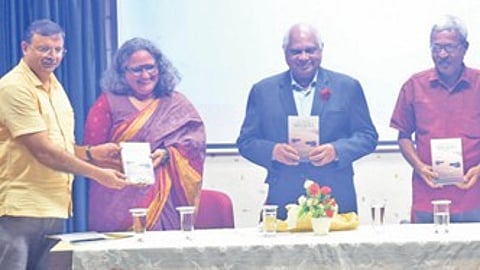

Former Allahabad High Court Chief Justice Ferdino Re bello emphasised the importance of vigilance, expertise, and pub lic participation in safeguarding Goa’s rights over the Mhadei riv er, at the launch of the book The River Mhadei – The Science and Politics of Diversion on Tuesday. While Goa has legal and ecolog ical backing, Rebello pointed out the pressing issue: the state lacks the infrastructure, par ticularly reservoirs, to store the allocated water. Rebello referred to the 2018 in terim award by the Inter-State Wa ter Dispute Tribunal, which grant ed Goa rights to 24 TMC of water from Mhadei for consumptive use. However, he noted that most of the proposed storage dam sites are within protected wildlife sanc tuaries or forested areas, where clearance would be difficult. “Without reservoirs, how will Goa use the additional allocation of water? It raises the paradox: an award may look like a victory, but execution may be infeasible,” he said. The Public Trust Doctrine, a key legal framework, places the state as a trustee of natural resources, including rivers, on behalf of the people. Rebello highlighted that rivers cannot be exploited for pri vate gain beyond limited use, a principle enshrined in Indian law. He also raised concerns over the environmental degradation caused by mining and casino vessels in Goa, which contribute to the pollution of river systems, including the Mandovi.
He also raised concerns over the environmental degradation caused by mining and casino vessels in Goa, which contribute to the pollution of river systems, including the Mandovi. He stressed that citizens, under the public trust doctrine, have the right to question such misuse. Justice Rebello also pointed out that many water allocations depend on future studies concerning climate change, hydrology, salinity, and wildlife impacts. “Experts recommend gathering at least 10–15 years of data be fore making definitive conclusions, particularly before the 2048 review by the Tribunal,” he said. He reiterated the need for citizen vigilance and cred ible scientific input in monitoring the river’s ecological health. Environmentalist Rajendra Kerkar, Secretary of the Mhadei Bachao Ab hiyan (MBA), called the book launch a significant moment for the Mhadei region. He highlighted that the compilation of 18 articles offers not only insights but also guidance for future actions. “The Mhadei River became Goa’s lifeline after the Mahadeyi and Netravali Wildlife Sanctuaries were notified in 1999. Together, these sanctuaries supply drinking water to nearly half of Goa’s population,” Kerkar said, recalling the struggle against Karnataka’s attempt to divert water in 2006. Kerkar also noted that the matter is still pending in the Supreme Court, stressing the importance of accurate engineering evidence to make a solid case for Goa. “Activists and citizens must continue their vigilance and pub lic awareness efforts,” he added. The book’s contributors offer a range of perspectives on the issue. Ri shikesh Desai discusses Karnataka's political motivations, while Dr A G Chachadi examines the geological aspects. Prof Rahul Tripathi of Goa Uni versity documents the decades-long debate, and Nirmal Kulkarni high lights the region’s biodiversity. The book also includes contributions from Maharashtra and Karnataka, reflecting the broader scope of the issue. Kerkar pointed out that the 2048 Tribunal review remains a critical milestone, and emphasised that the work doesn’t end with the interim award. “Documentation, public awareness, and vigilance are critical for the next phase,” he said. Sujata Noronha, a contributor, shared how her chapter focused on the living heritage of Mhadei through storytelling, engaging with 13 riverine communities. “We asked them: What are your memories of the river? What knowledge do you have of the river? What are your hopes for the river? This exercise revealed the deep emotional connection people have with the river, passing down values across generations,” she said. Peter Ronald de Souza, another editor of the book, suggested that it be translated into regional languages to ensure wider access. The book re lease was followed by an interactive session and a screening of a documen tary on the Mhadei river.